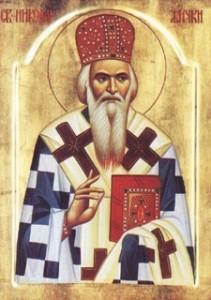 On March 18 the Church marks the repose of Saint Nikolai of Zicha.
On March 18 the Church marks the repose of Saint Nikolai of Zicha.
Nikolai Velimirovich was born in 1880 to a large family in the village of Lelich, Serbia, and spent his early years there. He was educated in Belgrade and Switzerland, earning a doctorate in theology in 1909.
The next years were filled with activity. He was tonsured a monk, keeping the name Nikolai. Ordained to the priesthood, he was then given the rank of archimandrite. He taught at his alma mater in Belgrade, using the summers to study in Russia. He went to England to lecture at Oxford and received honorary doctorates from Cambridge University and Glasgow University. In 1919 he returned to Serbia, where he was consecrated a bishop and appointed to the Dioceses of Zicha and Ochrid.
After two years as a missionary bishop in the United States, Bishop Nikolai went back to Ochrid. It was then that he wrote the “Prologue from Ochrid.” Its English translator, Mother Maria, describes the book: “The blend of lives of the saints and solid Christian teaching makes a rich mixture that is loved and valued in the Serbian-speaking world.” Bishop Nikolai himself had the vision to add the lives of 200 saints “from different Orthodox peoples” to the older Slavonic Prologue, thus making his book widely useful to more people seeking to learn about holy people in many countries.
Bishop Nikolai was in Zicha when the Nazis overran Yugoslavia. Like many other Serbs, he was sent to the terrible Dachau concentration camp. He survived, but deprivation and suffering permanently diminished his physical health.
However, his incarceration and survival also enabled him to view faith from two perspectives: freedom and imprisonment. So he offers a unique lesson in his answer to a question once posed to him, asking what particular spiritual exercise he practiced. Bishop Nikolai said, “I tried to visualize God’s presence. And as little as I succeeded, it helped enormously to prevent me from sinning in freedom, and from despairing in prison. If we kept the vision of the invisible God, we would be happier, wiser and stronger in every walk of life.”
When Bishop Nikolai returned to the United States in 1946, he taught at three Orthodox seminaries, including Saint Tikhon’s Seminary in Pennsylvania. He insisted on teaching in English, though until that time most courses had been offered in Russian. Bishop Nikolai’s vision led him to understand that men who would serve in American parishes needed to be taught in their own language.
| Kontakion – Tone 3 Born at Lelich in Serbia, you served as archpastor at the church of Saint Nahum in Ochrid. You presided on the throne of Saint Sava at Zhicha,teaching the people of God and enlightening them with the Gospel, bringing them to repentance and love for Christ. And for His sake you endured suffering at Dachau. Therefore, Nicholai, we glorify you as one newly well pleasing to God. |
Saint Nikolai’s vision was extensive. He found a lesson in the life of the unbaptized Mahatma Gandhi, writing: “Against weapons, ammunition and army Gandhi places fasting; against skill, wiliness and violence he places prayer; and against political quarrel, silence.”
Christ gave the example of fasting, prayer and silence to His disciples, of course. Bishop Nikolai considered Gandhi a “warning” from God to Christian believers not to abandon those three sources of spiritual power given by the Lord so long ago, but largely ignored today. The lesson Saint Nikolai took from Gandhi, like the others he offers, are helpful for every day of our lives.
